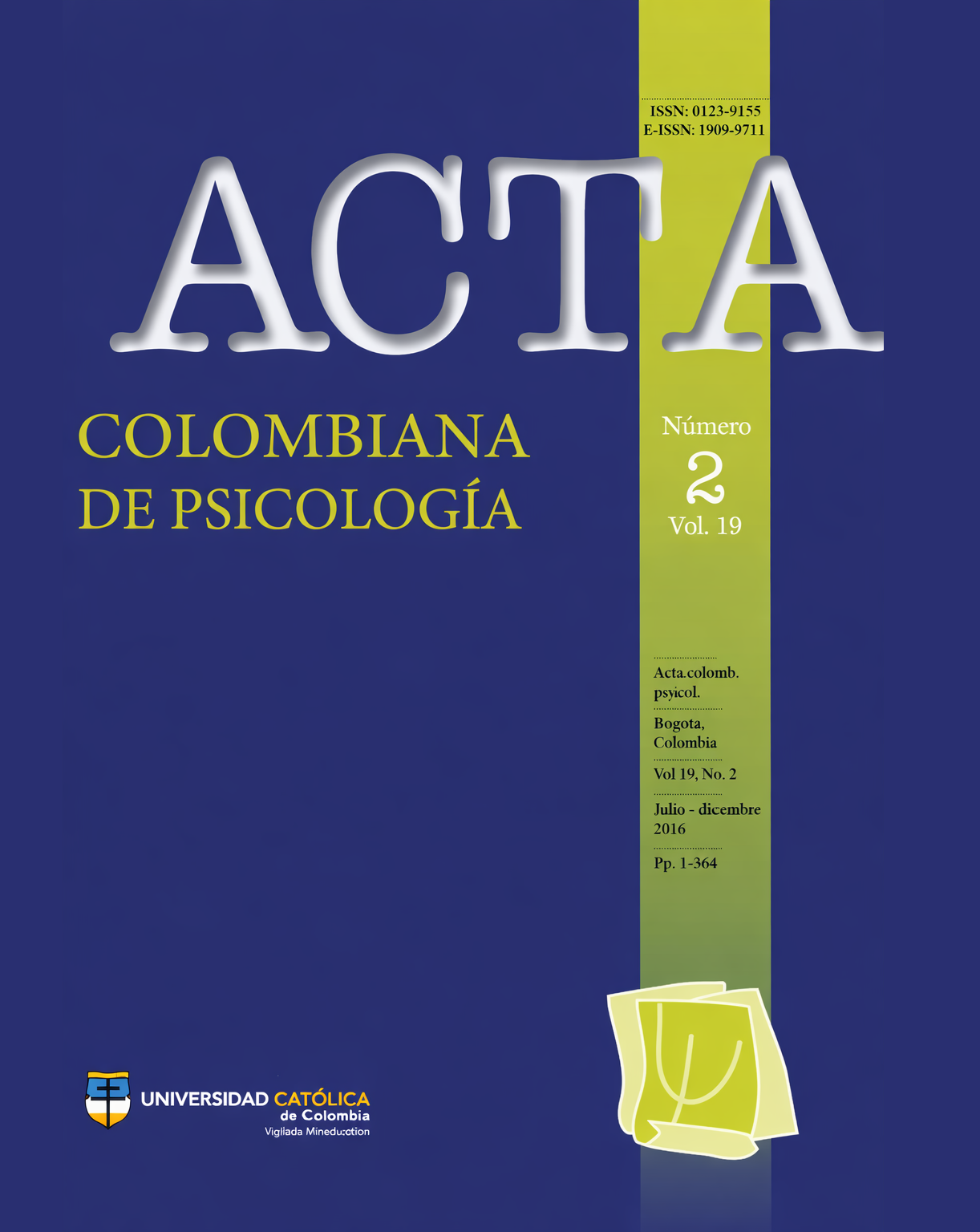Authors who publish in this journal agree to the following terms:
Acta Colombiana de Psicología complies with international intellectual property and copyright laws, and particularly with Article No. 58 of the Political Constitution of Colombia, Law No. 23 of 1982, and the Agreement No. 172 of September 30, 2010 (Universidad Católica de Colombia Intellectual Property Regulation).
The works published in the journal are licensed under a Creative Commons Attribution–NonCommercial–ShareAlike 4.0 International License, which allows third parties to use the published material provided that they acknowledge the authorship of the work and its first publication in this Journal.
Abstract
Violence against women and feminicides are some of the most severe problems in El Salvador. During the last few years, some legislative changes as well as changes in matters of public policies have taken place; however, increasing sensitivity and awareness on gender inequality in society have not matched the structural changes. Given this context, the design and validation of violence prevention and training programs is mandatory, as well as the implementation of useful tools for the internalization of these changes. The main objective of this work is to propose a tool for keeping records of everyday situations of gender inequality. This instrument has already been used in a gender-based violence prevention program whose evaluation was done through a quasi-experimental design (De Lemus, Navarro, Megías, Velásquez & Ryan, 2014) and sought to achieve one of its goals: to increase awareness on gender inequalities in everyday situations. Qualitative results obtained from this methodology based on other studies (Becker & Swim, 2011) are discussed with the aim of reducing sexist beliefs and gender discrimination.

References
Allport, G. W. (1954). The nature of prejudice. Cambridge, MA: Addison-Wesley. Becker, J.C. y Swim, J.K. (2011). Seeing the unseen: Attention to daily encounters with sexism as a way to reduce sexist beliefs. Psychology of Women Quarterly, 35, 227-242.
Buvinic, M., Morrison, A. y Shifter, M. (1999). Violence in Latin America and the Caribbean: A framework for action. Washington, DC: Inter-American Development Bank.
De Lemus, S., Navarro, L., Megías, J., Velásquez, M. y Ryan, E (2014). From sex to gender: A University Intervention to reduce sexism in Argentina, Spain and El Salvador. Journal of Social Issues, 70, 233-267.
Expósito, F., Moya, M., y Glick P. (1998). Sexismo ambivalente: Medición y correlatos. [Ambivalent sexism: measurement and correlates]. Revista de Psicología Social, 13, 159-169.
FESAL (2008). Encuesta Nacional de Salud Familiar. Informe Final. Recuperado de http://www.fesal.org.sv/
Glick, P., y Fiske, S. T. (1996). The Ambivalent Sexism Inventory: Differentiating hostile and benevolent sexism. Journal of Personality and Social Psychology, 70, 491-512.
Glick, P., y Fiske, S. T. (2001). Ambivalent sexism. En M. P. Zanna (Ed.), Advances in experimental social psychology (pp. 115-188). San Diego: Academic Press.
Hume, M. (2008). The myths of violence: Gender, conflict and community in El Salvador. Latin American Perspectives, 35, 59-76.
Jackman, M. R. (1994). The velvet glove. Berkeley: University of California Press.
Kilmartin, C.T., Smith, T., Green, A., Heinzen, H., Kuchler, M., y Kolar, d. (2008). A real-time social norms intervention to reduce college mens’ sexism. Sex Roles, 59, 264-273.
Massolo, A. (2005). Género y seguridad ciudadana: el papel y reto de los gobiernos locales. Estudios Centroamericanos, 681-682, 643-658.
Moya, M., Páez, D., Glick, P., Fernández, I. y Poeschl, G. (1997). Sexismo, masculinidad-feminidad y factores culturales. Revista Electrónica de Motivación y Emoción, 3, 127-147.
Navarro-Mantas, L. (2013). Resultados obtenidos a largo plazo de un programa de prevención de violencia de género. Entorno, 54, 12-19.
Navarro-Mantas, L., Velásquez, M. y López-Megías, J. (2015). Violencia contra las mujeres en El Salvador: Estudio Poblacional 2014. El Salvador: Editorial Universidad Tecnológica.
Nowak, M. (2012). Feminicide: a global problem. Small Arms Survey Research Notes, 14. Recuperado de: http://www.smallarmssurvey.org/fileadmin/docs/H-Research_Notes/AS-Research-Note-14.pdf
Pescador, E. (2010). Reconstrucción de las masculinidades. En E. Ryan y S. de Lemus (Eds.), Coeducación. Propuestas para alcanzar la igualdad de género desde las aulas. Granada: Editorial Universitaria.
PNUd (2011). La igualdad y la equidad de género en El Salvador: Cuadernos de Desarrollo Humano.
Pratto, F., y Walker, A. (2004). The bases of gendered power. En A. H. Eagly, A. E. Beall y R. J. Sternberg (Eds.), The psychology of gender (2nd ed) (pp. 242-268). Nueva York: The Guilford Press.
Rocha, T. y Cruz, C. (2013). Barreras estructurales y subjetivas en la transición de roles de mujeres mexicanas y su malestar emocional. Acta Colombiana de Psicología, 16, 123-135. Rudman, L. A., y Glick, P. (2008). Love and romance. En L. A. Rudman y P. Glick, the Social Psychology of Gender (pp. 204-230). Nueva York: The Guilford Press.
Shields, S. A., Zawadzki, M. J., y Johnson, R. N. (2011). The impact of a workshop activity for gender equity simulation in the academy (WAGES-Academic) in demonstrating cumulative effects of gender bias. Journal of Diversity in Higher Education, 4, 120-129.
Sidanius, J., y Pratto, F. (1999). Social dominance. An intergroup theory of social hierarchy and oppression. Nueva York: Cambridge University Press.
Swim, J. K., Hyers, L. L., Cohen, L. L. y Fergurson, M. J. (2001). Everyday sexim: Evidence for its incidence, nature and psychological impact from three daily diary studies. Journal of Social Issues, 57, 31-53.
Swim, J. K., Scott, E., Sechrist, G. B., Campbell, B. y Stangor, C. (2003). The role of intent and harm in judgments of prejuice. Journal of Personality and Social Psychology, 84, 944-959.
Swim, J. K., y Hyers, L. L. (2009). Sexism. In T. D. Nelson (Ed.), Handbook of prejudice, stereotyping and discrimination (pp. 407-430). Nueva York: Psychology Press.

































